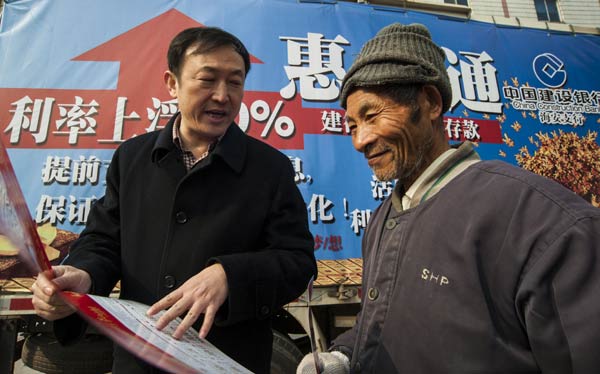Financial institutions may get incentives for extending loans to smaller businesses
 |
|
An employee of the China Construction Bank explains rural financial services to a villager in Haian, Jiangsu province. The government will offer subsidies or tax cuts to financial institutions for lending to rural clients. [XU JINBAI/FOR CHINA DAILY] |
The nation's monetary authorities on Wednesday pledged to offer the country's financial institutions more incentives to encourage them to lend to rural clients despite the increase in rural bad loan ratios.
Lu Lei, head of the research bureau at the People's Bank of China, the central bank, said greater coordination of monetary and fiscal policies is needed to boost bank lending to small rural enterprises, which could generate new business opportunities that might have been overlooked by the big financial institutions.
Speaking at a news conference in Beijing, Lu said that the government will continue to support rural lending by granting subsidies, tax cuts and targeted reserve requirement ratio cuts to qualified rural financial institutions.
The country's financial regulators seem to have raised their tolerance for banks' nonperforming loans in the rural areas to encourage more credit flows to the less-developed areas.
The rural NPL ratio of the country's financial institutions stood at 2.4 percent last year, up by 0.1 percentage point from the previous year, according to a rural financing report released by the PBOC on Wednesday.
Rural cooperative banks saw the biggest expansion of bad loans last year, with their NPL ratio rising by 0.5 percentage point to 2.7 percent, the report said.
Lu acknowledged the fact that banks tend to be more cautious toward the riskier rural lending business amid slower economic growth. But he said supportive government policies combined with market-based reforms in the rural financial sector, will help create a mechanism to manage the risks.
While the country's industrial sector has seen contraction, policymakers are hoping that greater credit support to the rural economy could spur new growth along with the urbanization and wider application of information technology in the rural areas.
The central bank has introduced targeted RRR cuts for rural financial institutions since last year to inject more capital into the rural economy.
In addition, the banking regulator has relaxed the restriction on private capital entering the rural financial institutions.
Lu said that the central bank will also give priority to the development of online financing to broaden the coverage of financial services in the rural areas.
Outstanding rural loans stood at 2.36 trillion yuan ($380 billion) as of the end of last year, up 13 percent from the previous year. Rural credit has grown at an annual rate of 21.7 percent over the past seven years, according to the PBOC report.
Meanwhile, the country's legislators are pushing legislation on rural financing to support the rural economy.
"The purpose is to institutionalize relevant government policies and pilot programs such as the launch of the rural credit system and the reforms on the rural collateral schemes," said Ji Min, deputy director of the finance research institute of the PBOC.
